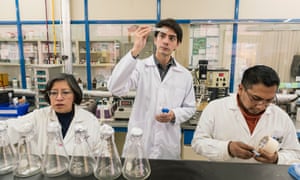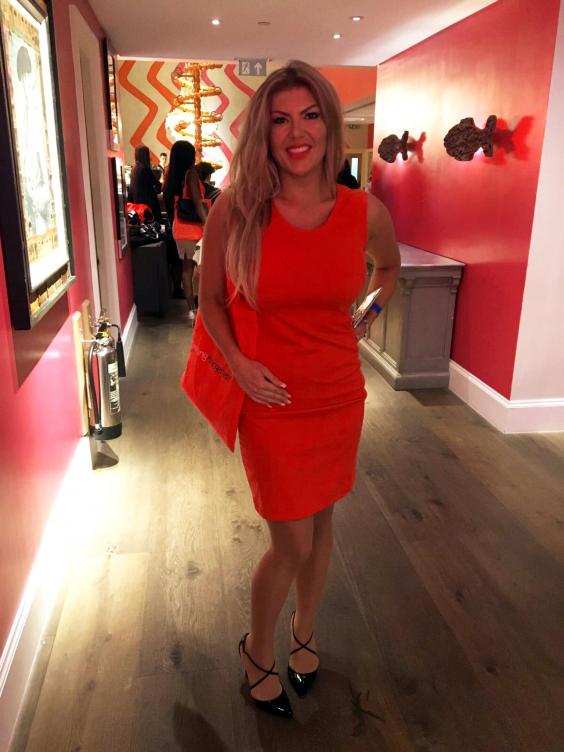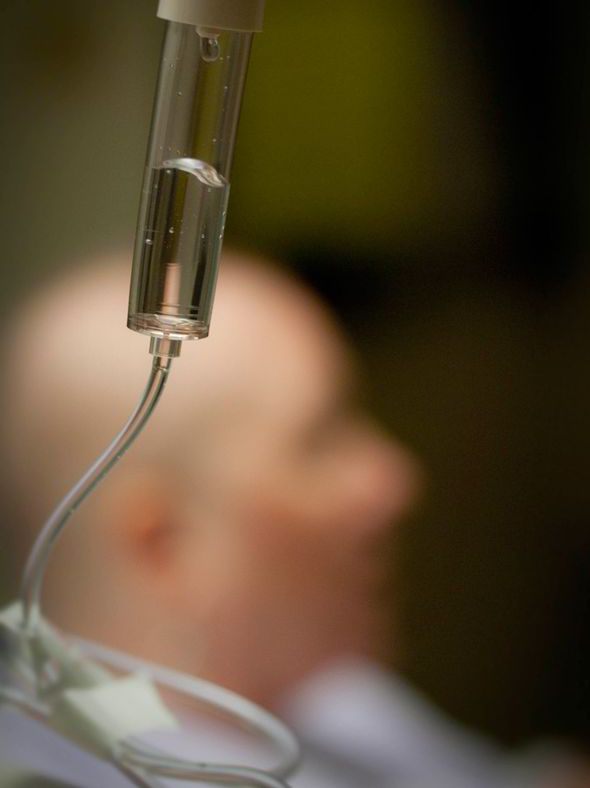
Javier Larragoiti (centre) and his Xilinat team in the lab in Mexico City. Photograph: Courtesy Xilinat
Javier Larragoiti was 18 when his father was diagnosed with diabetes. The teenager had just started a degree in chemical engineering in Mexico City. So he dedicated his studies to a side project: creating an acceptable alternative to help his father and millions of Mexicans like him avoid sugar.
“It’s only when you know someone with this sickness that you realise how common it is and how sugar intake plays a huge role,” he says. “My dad tried to use stevia and sucralose, just hated the taste, and kept cheating on his diet.”
The young chemist started dabbling with xylitol, a sweet-tasting alcohol commonly extracted from birch wood and used in products such as chewing gum.
“It has so many good properties for human health, and the same flavour as sugar, but the problem was that producing it was so expensive,” he says. “So I decided to start working on a cheaper process to make it accessible to everyone.”Quick guide
What is the Upside?ShowSign up here for a weekly roundup from this series emailed to your inbox every Friday
Ten years later, Larragoiti has patented a fermentation-based process to turn wasted corn cobs from Mexico’s 27.5m-tonne annual crop into xylitol. It is thereby solving a second problem: what to do with all that agricultural waste that otherwise might be burned, adding greenhouse gases to the overladen atmosphere.
His business, Xilinat (pronounced Hill-Ee-Natt), buys waste from 13 local farmers, producing 1 tonne of the product a year. This month his invention was awarded a prestigious $310,000 Chivas Venture prize award, which will enable him to industrialise production and scale up production tenfold.
Obesity is one of the fastest-growing global health problems. One in seven people are obese and about 10% have type 2 diabetes. Since 1980 the rate of obesity has doubled in more than 70 countries.
Larragoiti says that sugary diets are a real problem in Coca-Cola-lovingMexico, which has the world’s second-highest rate of obesity and has successfully taxed sugary drinks to try to combat a main source of the issue.
Paradoxically, another corn byproduct – fructose – is part of the problem, used to make corn syrup that has been linked to increasing obesity in the US.
“It’s kind of ironic,” Larragoiti says. “High fructose corn syrup is just a bomb of carbs and concentrated sugar that makes a high peak of insulin. It’s many times sweeter than regular glucose. Companies use and pay less and that’s the issue.”
Reusing agricultural waste is rapidly emerging as a promising sector for social entrepreneurs keen to tackle global heating and make useful things at the same time.
“One corn stalk has 70% to 80% waste by weight when you get down to it,” says Stefan Mühlbauer, the chief executive of the Sustainable Projects Group Inc. His company has a pilot plant in Alsace, France, and is building another in Indiana, US, to turn corn waste into a peat moss substitute and a super-absorbent foam for filters or soil. “Farmers are excited as it gives them something that extends their harvest season and they see another source of revenue,” he adds.
In Mexico, agricultural waste is often burned, releasing greenhouse gasesand creating one of the country’s highest sources of dioxin emissions. “Burning the residue is cheap and quick and may suppress pests and diseases,” says Dr Wolter Elbersen, a crop production expert at Wageningen University & Research. “The disadvantages such as air pollution, loss of organic matter and nutrients are less appreciated apparently. Removing the material for feed or compost, or added value products such as paper pulp or fuels is often not cost-effective, or no labour is available to do all the work in a short window of time.”
But thinking in a different way about “waste products” is essential if we are going to conserve scarce resources and feed a growing population, according to the Ellen MacArthur Foundation. “We need to think about the principles in the past, where we had to do much with little, and at the same time apply the technology we have at hand nowadays to succeed in the challenge of feeding the world,” says Clementine Schouteden, who leads the global initiative on the circular economy for food at the campaigning organisation.
“There’s definitely a sense of urgency in making sure that we farm in a way that is regenerative, preventing waste but also [creating value from] the waste that is currently not edible, with a food industry making the right options for consumers and for the planet.”
Xilinat’s idea has huge potential, according to Sonal Shah, the founding executive director of the Beeck Center for Social Impact + Innovation at Georgetown University, and a Chivas Venture judge. “It’s not just that he’s building a sugar substitute that tastes like sugar but that it’s going to become scalable so every company that uses sugar in its food has the opportunity to rethink what kind of substitute they use,” she said.
Ebersen added, though, that “you do, however, need a solution for using the leftovers after the xylose has been extracted and the demand for xylitol is small [currently] compared with the amount of residue”.
Meanwhile, what about Javier’s father? “My dad is super-happy,” Larragoiti says. “He uses my product every day and he’s willing not to cheat on his diet any more!”
Javier Larragoiti was 18 when his father was diagnosed with diabetes. The teenager had just started a degree in chemical engineering in Mexico City. So he dedicated his studies to a side project: creating an acceptable alternative to help his father and millions of Mexicans like him avoid sugar.
“It’s only when you know someone with this sickness that you realise how common it is and how sugar intake plays a huge role,” he says. “My dad tried to use stevia and sucralose, just hated the taste, and kept cheating on his diet.”
The young chemist started dabbling with xylitol, a sweet-tasting alcohol commonly extracted from birch wood and used in products such as chewing gum.
“It has so many good properties for human health, and the same flavour as sugar, but the problem was that producing it was so expensive,” he says. “So I decided to start working on a cheaper process to make it accessible to everyone.”Quick guide
What is the Upside?ShowSign up here for a weekly roundup from this series emailed to your inbox every Friday
Ten years later, Larragoiti has patented a fermentation-based process to turn wasted corn cobs from Mexico’s 27.5m-tonne annual crop into xylitol. It is thereby solving a second problem: what to do with all that agricultural waste that otherwise might be burned, adding greenhouse gases to the overladen atmosphere.
His business, Xilinat (pronounced Hill-Ee-Natt), buys waste from 13 local farmers, producing 1 tonne of the product a year. This month his invention was awarded a prestigious $310,000 Chivas Venture prize award, which will enable him to industrialise production and scale up production tenfold.
Obesity is one of the fastest-growing global health problems. One in seven people are obese and about 10% have type 2 diabetes. Since 1980 the rate of obesity has doubled in more than 70 countries.
Larragoiti says that sugary diets are a real problem in Coca-Cola-lovingMexico, which has the world’s second-highest rate of obesity and has successfully taxed sugary drinks to try to combat a main source of the issue.
Paradoxically, another corn byproduct – fructose – is part of the problem, used to make corn syrup that has been linked to increasing obesity in the US.
“It’s kind of ironic,” Larragoiti says. “High fructose corn syrup is just a bomb of carbs and concentrated sugar that makes a high peak of insulin. It’s many times sweeter than regular glucose. Companies use and pay less and that’s the issue.”
Reusing agricultural waste is rapidly emerging as a promising sector for social entrepreneurs keen to tackle global heating and make useful things at the same time.
“One corn stalk has 70% to 80% waste by weight when you get down to it,” says Stefan Mühlbauer, the chief executive of the Sustainable Projects Group Inc. His company has a pilot plant in Alsace, France, and is building another in Indiana, US, to turn corn waste into a peat moss substitute and a super-absorbent foam for filters or soil. “Farmers are excited as it gives them something that extends their harvest season and they see another source of revenue,” he adds.
In Mexico, agricultural waste is often burned, releasing greenhouse gasesand creating one of the country’s highest sources of dioxin emissions. “Burning the residue is cheap and quick and may suppress pests and diseases,” says Dr Wolter Elbersen, a crop production expert at Wageningen University & Research. “The disadvantages such as air pollution, loss of organic matter and nutrients are less appreciated apparently. Removing the material for feed or compost, or added value products such as paper pulp or fuels is often not cost-effective, or no labour is available to do all the work in a short window of time.”
But thinking in a different way about “waste products” is essential if we are going to conserve scarce resources and feed a growing population, according to the Ellen MacArthur Foundation. “We need to think about the principles in the past, where we had to do much with little, and at the same time apply the technology we have at hand nowadays to succeed in the challenge of feeding the world,” says Clementine Schouteden, who leads the global initiative on the circular economy for food at the campaigning organisation.
“There’s definitely a sense of urgency in making sure that we farm in a way that is regenerative, preventing waste but also [creating value from] the waste that is currently not edible, with a food industry making the right options for consumers and for the planet.”
Xilinat’s idea has huge potential, according to Sonal Shah, the founding executive director of the Beeck Center for Social Impact + Innovation at Georgetown University, and a Chivas Venture judge. “It’s not just that he’s building a sugar substitute that tastes like sugar but that it’s going to become scalable so every company that uses sugar in its food has the opportunity to rethink what kind of substitute they use,” she said.
Ebersen added, though, that “you do, however, need a solution for using the leftovers after the xylose has been extracted and the demand for xylitol is small [currently] compared with the amount of residue”.
Meanwhile, what about Javier’s father? “My dad is super-happy,” Larragoiti says. “He uses my product every day and he’s willing not to cheat on his diet any more!”









 61 Comments
61 Comments